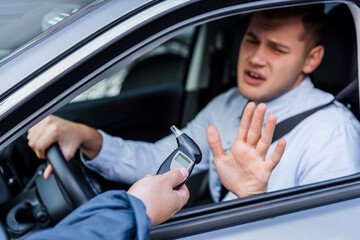If you are facing criminal charges for a DUI (Driving Under the Influence) in Georgia, you likely submitted to a breathalyzer test upon your arrest. The results from a breathalyzer are reliable, but you can challenge them in court under certain circumstances. To learn more about your legal rights and secure experienced representation during your case, contact an Atlanta DUI lawyer at Williamson Legal today.
What is a Breathalyzer?
A breathalyzer is a device often used by law enforcement to determine an individual’s blood alcohol concentration (BAC). During a traffic stop for a suspected DUI, the police officer will likely request that you submit to a breath test. You will blow air into the device for a few seconds and wait for it to analyze the sample for the concentration of alcohol in your breath.
In Georgia, like all states in the U.S., the legal limit is 0.08%. If the breathalyzer results are 0.08% or higher, you are considered legally impaired and can be charged with a DUI.
How Can I Challenge a Breathalyzer in GA?
Breathalyzer tests are often the basis for DUI cases, and the results are admissible in court. However, there are certain instances where the data can be challenged. Below are some valid legal grounds for challenging a breathalyzer.
- Device error: Breathalyzers must be up to date, meaning regularly calibrated, inspected, and maintained. If the device was improperly calibrated or overdue for maintenance at the time of your test, the results may be unreliable and could be challenged.
- User error: It is also important that the officer administering the test is certified and knowledgeable on the device. If the officer lacked proper training, their certification lapsed, or they failed to follow standard operating procedures, it could be considered grounds for challenging the results.
- External factors: There are many factors that can influence the outcome of a breath test. Certain medical conditions can inflate readings or environment factors like medications or breath sprays could affect the results. If you can provide evidence that some condition or situation skewed the results, you can challenge the test.
- Violation of your rights: While you give your implicit consent to submit to a breathalyzer by operating a vehicle on public roads, you still have certain rights. If the traffic stop or arrest were illegal and lacked probable cause, any evidence collected could be considered inadmissible, including the results of a breathalyzer.
- Chain of custody issues: In any case, there must be a secure chain of custody for evidence. If the breathalyzer results or sample were not properly documented, stored, or handled, you could argue that the evidence is tainted or unreliable.
There are many defensive options available to you during a DUI case, depending on the details of your situation. It is crucial that you have skilled legal representation, so reach out to an experienced attorney today for more information and advice.

